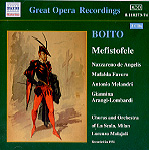Boito’s librettos for Verdi’s Otello and Falstaff are his major legacy, but his music is largely forgotten. His Faust opera, Mefistofele, was performed often in Italy before World War II; today it’s rarely done. Only the Prologue and a couple of arias find their way onto concert programs. But it has fared well on recordings, including this first one made in 1931, directed by Lorenzo Molajoli, EMI’s Italian opera house conductor of the time. He conducts a virile, dramatic performance with a cast of experienced verismo singers who have the stylistic know-how to make it come alive.
Two outstanding sopranos take the leading female roles. Mafalda Favero, a La Scala mainstay of the pre-war period, sings Margherita with lyric intensity. Her every number is full of ardor, and she makes her death scene a moving experience. Helen of Troy, a dream figure, is a short but critical role. Here it’s sung by Giannina Arrangi-Lombardi, La Scala’s Aida, Santuzza, Trovatore Leonore, and other “big” roles in the 1920s. Her Helen is a classic performance, rich-voiced, admirably detailed, and rising to tragic heights as she sings of the fall of Troy.
The men are on a lesser–though still quite adequate–plane. Bass Nazzareno de Angelis sang the title role some 500 times between 1906 and 1938, and it tells. He captures the various sides of the character, lying, bullying, and ranting with the best of them, and if the singing is on the rough side, a devil with patches of coarseness and uneven pitch is a relatively minor offense. Bringing up the rear is the Faust, tenor Antonio Melandri. He starts roughly and gathers strength as the opera proceeds–but he never makes you care about this Faust, leaving a hole in the middle of the performance. It’s the kind of singing that you wouldn’t object to in the opera house but don’t especially want on a recording. Still, this Mefistofele is well worth hearing, and it’s a viable supplement to an opera catalog that already includes preferred modern performances in fine stereo sound featuring the likes of either Tebaldi and Serafin or Freni and Pavarotti on Decca, or Caballé and Treigle on EMI.
Ward Marston’s transfer from Italian 78s allows more space and dynamics than we usually hear from vintage reissues more than 70 years old–although there’s the inevitable congestion in places. The filler consists of five Rossini and Verdi arias made by de Angelis in 1927 and 1928 that do nothing for his reputation. The Rossinis are effortful and misconceived, and the great aria from Don Carlo is badly mauled. But the main attraction retains its luster, and at the Naxos price, it’s an attractive buy.
































